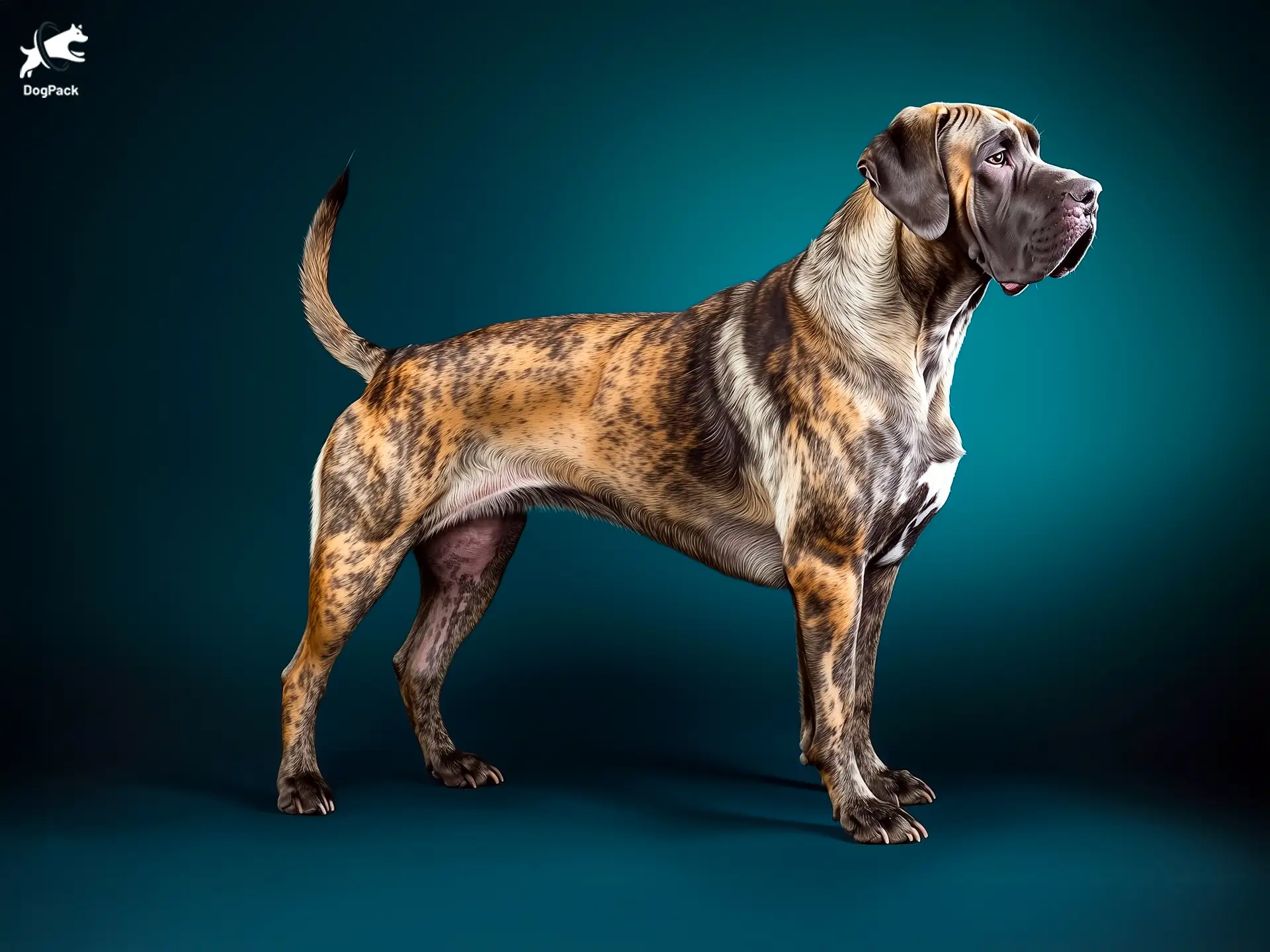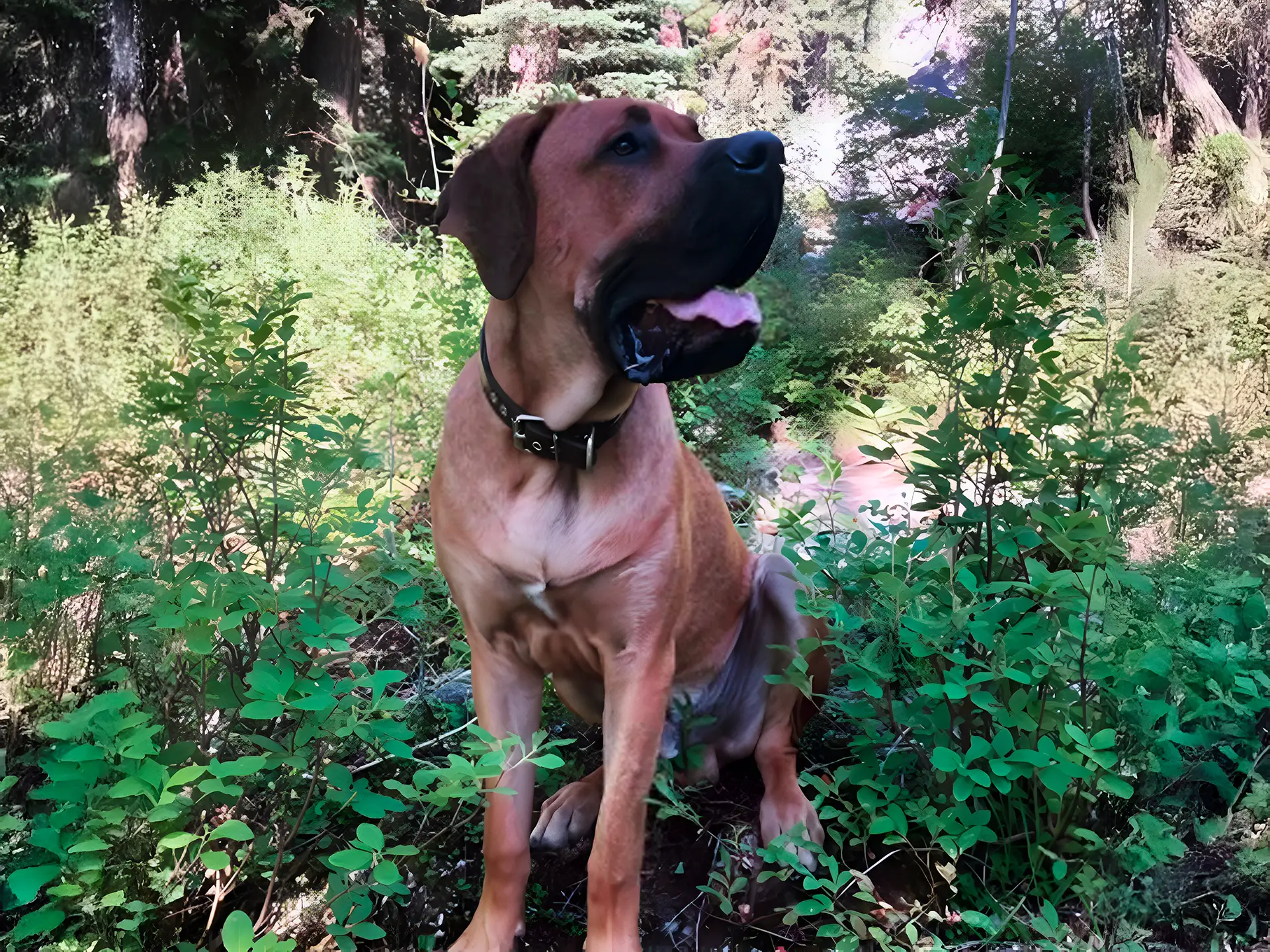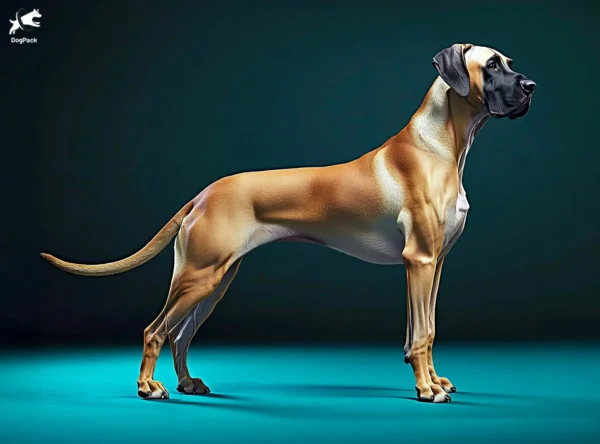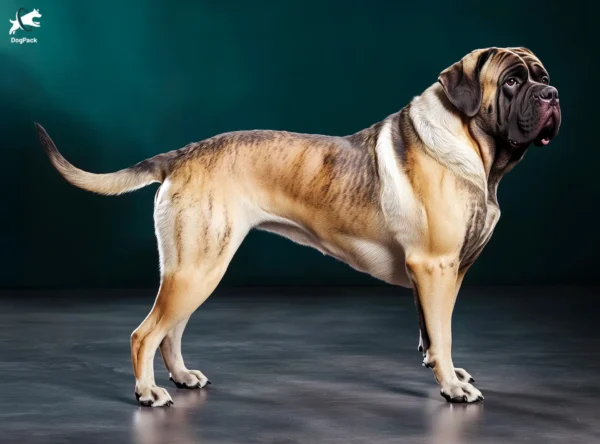Daniff Dog Breed Info & Overview
The Daniff, a majestic mix of the Great Dane and Mastiff, embodies the best of both breeds. This gentle giant combines the height of a Great Dane with the muscular build of a Mastiff, creating a powerful yet affectionate companion. Known for their protective instincts and sweet demeanor, Daniffs are wonderful family dogs, offering both loyalty and a loving presence in a uniquely balanced package.
Characteristics
Pictures
Breed History
The Daniff is a relatively new hybrid breed, emerging in the United States by crossing the Great Dane and the Mastiff. Breeders aimed to combine the gentle, friendly nature of the Great Dane with the protective instincts and robust build of the Mastiff. The result is a dog that embodies the best qualities of both parent breeds.
While not recognized by major kennel clubs, the Daniff has gained popularity among dog enthusiasts seeking a large, affectionate companion. The breed inherits a rich history from its parents—the Great Dane, known as the “Apollo of Dogs,” and the Mastiff, one of the oldest dog breeds dating back to ancient civilizations.
Despite its relatively recent origin, the Daniff is valued for its loyalty and family-friendly demeanor. As more people discover this gentle giant, the breed continues to grow in popularity, particularly among those who appreciate its impressive size coupled with a warm heart.
Temperament, Personality
Daniffs are renowned for their gentle and affectionate nature. They often think they’re lap dogs despite their massive size, happily snuggling up with family members. Their Great Dane lineage contributes to their friendly demeanor, making them great companions for both adults and children.
Protective instincts inherited from the Mastiff make the Daniff an excellent guardian. They are naturally watchful and can be reserved around strangers until they deem them trustworthy. Early socialization is key to ensure they are well-mannered and comfortable in various situations.
Though generally calm, Daniffs have a playful side and enjoy interactive games with their loved ones. They thrive on companionship and may not do well if left alone for extended periods. Their loyal and devoted personality makes them a cherished member of any household.
Physical Characteristics
Daniffs are imposing dogs, inheriting the towering height of the Great Dane and the muscular build of the Mastiff. They typically stand between 27 to 33 inches tall and can weigh anywhere from 115 to 190 pounds. Despite their size, they are known for their graceful movement and balanced proportions.
Their coat is usually short and dense, coming in various colors like fawn, brindle, black, or even a mix. The Daniff’s facial features often include the Mastiff’s broad head and the Great Dane’s expressive eyes, giving them a noble and affectionate appearance.
One distinctive feature of the Daniff is their expressive, droopy jowls, which can lead to occasional drooling—a small price to pay for such an affectionate companion. Their overall physique exudes strength and elegance, capturing attention wherever they go.
Health Issues
Like all breeds, Daniffs are prone to certain health issues, some inherited from their parent breeds. One common concern is hip dysplasia, a genetic condition affecting the hip joints. Regular veterinary check-ups and maintaining a healthy weight can help manage this risk.
Daniffs may also be susceptible to bloat, a serious condition where the stomach fills with gas and twists. Feeding them smaller, frequent meals and avoiding vigorous exercise after eating can reduce this risk. Awareness of the symptoms is crucial for prompt treatment.
Other potential health issues include heart problems and certain types of cancer. Regular screenings and a proactive approach to healthcare can ensure your Daniff leads a long, healthy life. Always consult with a veterinarian experienced with large breeds for tailored advice.
Grooming Needs
Good news for the busy pet parent—the Daniff’s grooming needs are relatively low-maintenance. Their short coat requires brushing once or twice a week to remove loose hair and keep their coat shiny. This also helps in bonding with your pet.
Due to their size, bathing a Daniff can be a bit of a workout. However, they don’t need frequent baths unless they’ve gotten particularly dirty. Using a gentle dog shampoo will keep their skin healthy and prevent dryness.
Don’t forget about dental care and nail trimming. Regular teeth brushing and providing dental chews can help maintain oral health. Nails should be trimmed regularly to prevent overgrowth, which can be uncomfortable for your Daniff.
Exercise Requirements
Despite their size, Daniffs have moderate energy levels. They require daily exercise to keep them fit and prevent boredom, which can lead to destructive behaviors. A couple of walks a day combined with some playtime should suffice.
Due to their large size, they aren’t ideal jogging partners, but they enjoy leisurely strolls and exploring the outdoors. Activities like fetch in a spacious yard can also help burn off energy and keep them engaged.
It’s important not to over-exert your Daniff, especially when they’re puppies. Their growing joints can be sensitive, so exercise should be appropriate for their age and size. Consult with your vet to develop an exercise plan suitable for your Daniff.
Training Tips
Training a Daniff is essential due to their size—they need to learn good manners early on. Fortunately, they are intelligent and eager to please, which makes training a rewarding experience. Consistent, positive reinforcement methods work best.
Socialization should begin early to help them become well-rounded dogs. Exposing them to different people, environments, and other animals can reduce any potential for over-protectiveness. Puppy classes can be a great way to start.
Due to their strength, leash training is crucial. Teaching your Daniff to walk politely on a leash will make outings more enjoyable for both of you. Patience and consistency are key, and remember to keep training sessions fun and engaging.
Nutrition, Diet
Feeding a Daniff requires attention to their large size and specific nutritional needs. They benefit from high-quality dog food formulated for giant breeds, which supports their growth and overall health. Consult your veterinarian to determine the best diet.
Portion control is important to prevent obesity, which can exacerbate joint issues like hip dysplasia. Dividing their daily food intake into two or three meals can aid digestion and reduce the risk of bloat. Avoid free-feeding or overindulging with treats.
Daniffs may consume between 6 to 10 cups of dry food per day, depending on their age, weight, and activity level. Always provide fresh water, and monitor their weight regularly to adjust their diet as needed. Specialized diets may be necessary for any health concerns.
Adoption, Breeders
If you’re considering adding a Daniff to your family, it’s important to find a reputable breeder who prioritizes health and temperament. Ask for health clearances for both parent breeds to ensure you’re getting a healthy puppy.
Adoption is another wonderful option. Many rescue organizations specialize in large breeds or even Daniffs specifically. Organizations like the Great Dane Rescue or Mastiff Rescue may have Daniffs looking for a forever home.
Whether adopting or purchasing from a breeder, take the time to meet the dog and ask questions about their health history and personality. A responsible breeder or rescue will be happy to provide this information and ensure a good match.
Family Pet?
Daniffs can make excellent family pets, especially for families that have ample space and appreciate large dogs. Their gentle and affectionate nature makes them great companions for children, though supervision is advised due to their size.
They often get along well with other pets, particularly if they are socialized from a young age. Their protective instincts mean they will watch over your family, providing both companionship and a sense of security.
Keep in mind that their size can be overwhelming for small children or frail individuals. Training and socialization are key to ensuring they interact safely with all family members. Overall, the Daniff’s loving disposition makes them a delightful addition to many households.
Right For You?
Before bringing a Daniff into your life, consider whether you can accommodate their size and needs. They require ample living space and a commitment to regular exercise and training. If you have room in your home and heart, they can be incredibly rewarding pets.
Daniffs are best suited for owners who are experienced with large breeds or are willing to invest time in proper training. Their moderate energy levels mean they don’t need endless exercise, but they do thrive on companionship and interaction.
If you’re seeking a loyal, affectionate, and protective companion, the Daniff might just be the perfect match. They bring together the best qualities of the Great Dane and Mastiff, offering a unique blend of gentleness and guardianship.
Conclusion
Bringing a Daniff into your family can be a rewarding experience filled with love and companionship. Their gentle nature combined with a protective instinct makes them both a friend and guardian. If you have the space and are prepared for the responsibilities that come with a giant breed, the Daniff might just be the perfect addition to your home.
FAQs
-
How big does a Daniff dog get?
A Daniff can reach heights of 27 to 33 inches and weigh between 115 to 190 pounds. Their size varies depending on genetics, but they generally inherit the large stature of both the Great Dane and Mastiff.
-
Are Daniffs good with other dogs?
Daniffs can get along well with other dogs, especially if socialized early. Their friendly nature often extends to canine companions, but due to their size, supervised interactions are recommended to ensure safety for all pets involved.
-
How much does a Daniff puppy cost?
The cost of a Daniff puppy can vary widely, typically ranging from $500 to $1500. Prices depend on the breeder’s reputation, lineage of the parents, and location. Always ensure you’re purchasing from a responsible breeder.
-
Do Daniffs make good apartment dogs?
Due to their large size, Daniffs are not ideally suited for apartment living. They require ample space to move comfortably. A home with a spacious interior and access to a yard is preferable for their well-being.
-
What kind of coat does a Daniff have?
Daniffs usually have a short, dense coat that is easy to maintain. Their coat can come in various colors, including fawn, brindle, black, and sometimes a mix. Regular brushing keeps their coat healthy and reduces shedding.
Breed Ratings
The Daniff is fairly intelligent, inheriting the smarts from both parent breeds. They learn commands well with consistent training.
While they enjoy playtime, Daniffs are moderately playful. They appreciate interactive games but also enjoy lounging with the family.
With moderate energy levels, they require daily exercise but are not overly hyperactive, making them suitable for various lifestyles.
Daniffs shed a moderate amount. Regular brushing helps control shedding and keeps their coat in good condition.
They generally have a low prey drive but may occasionally chase smaller animals. Early socialization can minimize this behavior.
With their short coat, grooming is relatively easy. Weekly brushing and occasional baths are sufficient to keep them clean.
Daniffs are eager to please and respond well to positive reinforcement, making them relatively easy to train despite their size.
They prefer companionship and may become anxious if left alone for long periods. Ideal for owners who are home often.
Typically quiet, Daniffs aren’t known for excessive barking but will alert you if something is amiss.
Due to their Mastiff heritage, moderate drooling can be expected. Keep a towel handy for those affectionate slobbers.
Generally friendly with other dogs, especially when socialized early. They enjoy canine companionship and playdates.
While generally healthy, they can be prone to certain large-breed health issues. Regular vet care is important for a long, healthy life.














